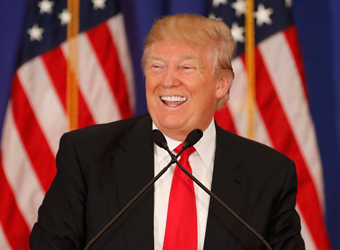Senate Democrats are mounting a filibuster of US President Donald Trump’s Supreme Court pick, a rare obstruction of high-court appointments. If the gambit proves successful this coming week, Republicans will likely go nuclear.
The Senate faces an epic showdown beginning Monday over whether to confirm Judge Neil Gorsuch. It is a very public game of political chicken that could shape the makeup of the Supreme Court for years to come, and unravel any remaining pretence of bipartisanship in the upper chamber of Congress.
Should Democrats block Gorsuch, Trump’s Republicans are threatening to respond by altering longstanding Senate rules and bypassing the 60-vote threshold to advance nominees in the 100-member chamber.
Such a maneuver is known as the nuclear option.
And its results could be hugely consequential, on both sides of the political aisle.
“It churns our stomach,” Senator Mike Rounds told reporters when asked about whether fellow Republicans were really prepared to change the rules.
“Once they let the genie out, it’s not going back in, unfortunately.”
All Senate confirmations — for cabinet posts, to judgeships on a federal bench, to Supreme Court picks — technically require a simple majority vote of 51 senators.
That would not be difficult for Republicans today, given that they control 52 seats.
Bumping the threshold up to 60 for a Supreme Court pick has only occurred four times in modern history. Never has a filibuster derailed a Supreme Court nominee.
“This would make history in a very bad way,” White House spokesman Sean Spicer said Friday.
Republicans would not be the first to go nuclear. Democrat Harry Reid unlocked the process in 2013 when he was Senate majority leader, changing the rules to lower the magic number from 60 to 51 on all presidential nominees — except Supreme Court justices.
Republicans will need eight Democrats to break the filibuster and get Gorsuch onto the bench, which has been one justice short since conservative Antonin Scalia died in February 2016.
That will be a tall order, especially given the volcanic anger many Democrats still feel over the treatment of Merrick Garland, then-president Barack Obama’s pick to replace Scalia.
While Republicans blast Democrats’ unprecedented obstructionism of Gorsuch, Senate Majority Leader Mitch McConnell let Garland languish for eight months without a vote. When Trump won the election, Garland’s nomination was dead.
Just two Democrats, Joe Manchin and Heidi Heitkamp, both from states that backed Trump, have announced support for Gorsuch.
At least 36 have said they will join the filibuster, according to US media counts. If they reach 41, Gorsuch is blocked.
But Republican leadership has signaled its readiness to change the rules if need be, a potentially toxic move.
“The United States Senate will confirm Judge Neil Gorsuch, one way or the other,” Vice Presiden Mike Pence said Saturday in Ohio.
McConnell, who said he is “confident” Gorsuch will make it through, has set the final confirmation vote for next Friday, after Monday’s vote in the Judiciary Committee. The all-important test vote to end debate is likely to come Wednesday.
The bitter nominations battle is seen as a proxy for a broader war over Trump’s policies, with Democrats anticipating political benefit in opposing the nominee of a deeply unpopular president.
The Gorsuch nomination has proved a unifying force for Republicans, more so than any other topic this year, including Trump’s plans to revamp health care and reform the tax code.
But some Republicans worry that changing the rules to ram Gorsuch through would mean an end to presidents seeking out consensus or mainstream candidates, further polarizing an already divided nation.
“The next president coming in will not in any way be bound by that, right? They can nominate… an extreme person” if there is no check on the president’s choice, said Republican Senator Bob Corker.
The chamber, he said, is in a spiral downward.
Other Republicans have warned about a boomerang effect- Democrats ramming through liberal justices once the GOP loses the White House.
Senate Minority Leader Chuck Schumer said it was “complete hokum” for Republicans to portray the options as either confirm Gorsuch or exercise the nuclear option.
“You don’t need to change the rules if Judge Gorsuch doesn’t get 60 votes,” Schumer said Thursday. “You just need to change the nominee.”
Liberal activist groups demand Democrats stand their ground, warning that they will urge party leaders to not give campaign funds to any senator who supports Gorsuch.
Source: AFP


